|
 Black Jack Logan is actually John A. Logan, but not
the doctor for whom our county is named. He is the son of that
doctor and served the Union Army as an Illinois native who led the
Illinois 31st Infantry. He also for a time led the 15th, but his
heart belonged to his boys from Illinois and the battles he led them
through played an important role in the Union victory over the
confederates. Black Jack Logan is actually John A. Logan, but not
the doctor for whom our county is named. He is the son of that
doctor and served the Union Army as an Illinois native who led the
Illinois 31st Infantry. He also for a time led the 15th, but his
heart belonged to his boys from Illinois and the battles he led them
through played an important role in the Union victory over the
confederates.
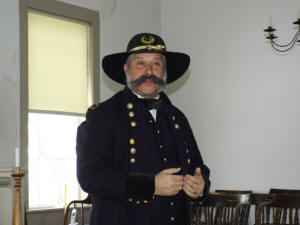
The role of Black Jack Logan was portrayed by Brian
Fox Ellis, who has a particular love for his Logan character, to the
extent that he even owns a museum in Murphysboro dedicated to the
famous General.
At the end of his presentation on Saturday, Ellis also shared that
he has been doing historic interpretation as a career for the past
40 years. He has a new book coming out that will talk about all the
characters he has portrayed over his career.

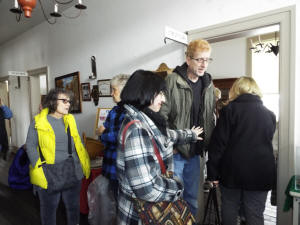
The afternoon of celebration in Mount Pulaski started at noon and
wrapped up at around 4 p.m. As guests arrived they were invited to
enjoy apple pie with rum sauce, which is reported to be Lincoln’s
favorite dessert. There were also nicely decorated sugar cookies
wishing Abe a happy birthday and a red punch.
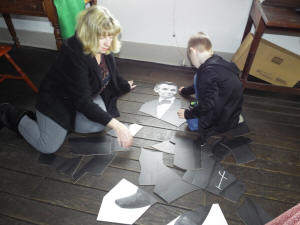
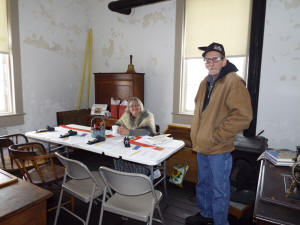

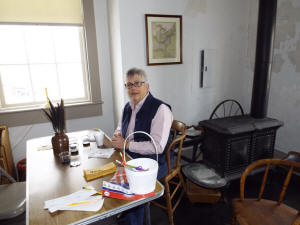
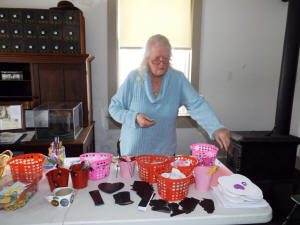
The downstairs rooms were set up with activities for children
including a true-to-life-size puzzle of Lincoln, the opportunity to
learn Morris Code, a chance to write with a quill feather pen like
Lincoln would have used and to also try to copy Lincoln’s signature.
The final room was dedicated to the upcoming Valentine’s Day. There
kids had the opportunity to use a variety of craft items to create
Valentines for someone special.
While guests enjoyed the treats and activities, they had the
opportunity to visit with the great man himself. President Lincoln
complete with hat and beard was on hand along with Mrs. Lincoln. The
two enjoyed seeing guests there to honor the President.
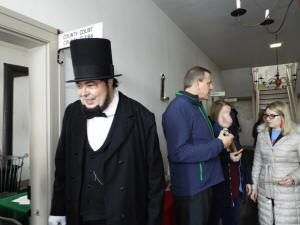
Abe (portrayed by John Walther) shared some tales of
his youth, his life in New Salem and the time he spent floating down
the Mississippi on a handmade flat boat.
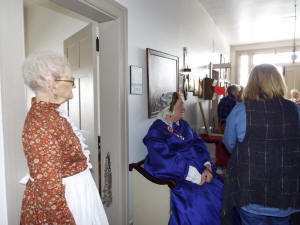
Mrs. Lincoln (portrayed by Ashley Pennington) was
more demure, visiting with those who approached her, but for the
most part spending her time drinking in the sight of so many people
enjoying time with her husband.
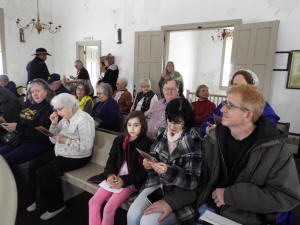
At 1 p.m. everyone was invited to go upstairs for the
program presented by Ellis.
For this day, the presentation was set up like a press conference.
Guests were given specific questions to ask Black Jack Logan and
through those questions the story of Logan unfolded.
The first question pertained to Logan’s family and his boyhood years
in Illinois. Logan began by saying “your story begins long before
you are born.” He spoke first about how his father had become a
horse trader. There was a plentiful supply of horses in Illinois and
a demand for them in the south. The original John Logan would take a
flatboat full of horses down the Mississippi to New Orleans where
they would be sold for a total of about $1,000, a huge amount of
money in the early 1800s. He would then ride a horse back to
Illinois and repeat the process.
The senior Logan married a wealthy widow who later
died of cholera along with their child. Logan gained his wealth
through his wife. Along the way on the story of his life, Dr. Logan
moved to Jackson County in Illinois, he donated 20 acres of his land
to establish the county seat of Murphysboro, he studied medicine,
remarried, and became a State Representative. He became a close
friend to Abraham Lincoln during his term in office.
[to top of second column] |

Dr. Logan held considerable political influence. When
the Illinois Legislature's special Committee on Counties, chaired by
Abraham Lincoln, brought forward the Bill to split the sprawling
Sangamon County into four smaller counties, Lincoln put his friend,
co-legislator and powerhouse name for one county - Sangamon, Logan,
Menard and Dane (Dane was later changed to Christian). The Act
passed February 15, 1839.
Black Jack Logan went on to say that as a child he was fierce and
brave and had a knack for winding tall tales, stretching the truth
to make his story a bit better. He related the story of saving his
little brother from a cougar by killing the animal with a glass
bottle, but never said if that was all fact or a bit of fiction.

The second question to General Logan, spoke to his relationship with
Abraham Lincoln. Lincoln and the senior Logan were close friends,
did that friendship carry on to the son?
Logan said his relationship with Lincoln was “tricky” because they
were often on opposite sides prior to the Civil War. Logan was a
supporter of Douglas and called himself a “southern democrat.” At
the same time, Logan did respect the President, and served him well
when in the army.
Logan was asked if he was a Copperhead. Copperheads
of the Civil War era where also known as the Peace Democrats who
were opposed to the war and felt that the conflict between the Union
and the Confederates could be settled through negotiation.
Logan denied vehemently that he was ever a Copperhead and said he
had been labeled as such by association with his father-in-law and
brother-in-law who were indeed Copperheads. He noted that he also
had a brother who joined with the Confederates.
Logan fielded questions about his relationship with General Ulysses
S. Grant and talked about his leadership of the 31st. He told the
audience that he led his group into battles that were key to the
success of the Union and that he took the difficult tasks. As a
result, “the 31st became known as the dirty-first.”
Black Jack spoke about the time he was wounded and reported dead.
His wife read about his alleged death in the newspaper, but then
found out that indeed her husband was still alive, though not in
good shape. She traveled into the deep south and brought her husband
home to heal. Logan’s injury was in his right arm, but gangrene set
in and it was touch and go for a bit, but he did recover. Later that
injury would come back to haunt him and eventually was the cause of
his death.
Logan told humorous stories about battles including the story of a
young black soldier who took a direct hit from a cannon ball. He was
literally “blown sky high” as a result. When the young black man
came back down to the ground, he got up brushed himself off and
returned to battle unharmed. As a result, Black Jack renamed the
young man “Abraham.”
Another question posed to Logan was about his change of heart for
the slaves. It was noted that in his earlier years, Logan was
definitely a racist, so why did he fight for the freedom of slaves?
Logan said indeed he was somewhat racist. As an Illinois
Representative, in 1853 he helped pen and pass a law to “prohibit
all African Americans, including freedmen, from settling in the
state.”
Logan said he joined the army to defend the Union, with little
consideration for the plight of slaves. It was not about human
rights for him at that time, but rather about preserving the United
States and defeating the Confederate uprising.
He said that his parents had felt much the same way and that his
early beliefs were molded by what he had learned at home. However,
that did change for Logan in the midst of the war.
With deep emotion, Logan told the story of a young black woman named
Zulla who had escaped her master. While a slave she had been her
master’s concubine and was not treated well by the man at all. She
ended up with the thirty-first, cooking and washing clothes.
The master found out where she was and sent her a letter. She
couldn’t read so she brought it to Logan to read to her. In the
letter the master asked her to come back and made the statement “I
love you.” Logan said he tried to warn her that it was a ploy and
that if she returned to the master she would bear unbearable things
at his hand. But, Zulla did return to her master, filled with hope
that he did truly love her. To punish her for her escape, he
promptly sold her and sent her out of his life forever, while
keeping her in bondage.
Throughout his presentation, Ellis would from time to time break
into song, and urging the audience to join in the singing of songs
such as Swing Low Sweet Chariot.
He told a good many more stories and shared his point of view about
the many battles of which he was a part. He shared that twice
President Lincoln passed him up for General stars and both times,
Grant wrote to the President and persuaded him to reconsider.
The last question of the day was about the founding of the annual
holiday Memorial Day. Logan said it was not his doing but his wife
who had actually brought the day to fruition as an annual
“Decoration Day” when flowers were to be placed on the graves of
fallen soldiers.
Decoration Day would later become Memorial Day, a day to honor and
remember fallen soldiers in all wars and conflicts.

Logan was also very fond of his horse Slasher, and spoke often about
mounting his steed and riding into battle. The horse was lost in
action in the Battle of Belmont in November, 1861.
After his initial presentation with pre-written questions, Ellis
also addressed additional questions from the audience including how
and when the general died. There was also a question about whether
or not the general had crossed the lines a time or two, doing things
that were unscrupulous. Speaking as Ellis, an expert on Logan, he
responded by drawing a similarity to modern times and said he would
simply say “often investigated – never convicted.”
In addition to his performance at the courthouse on Saturday, Ellis
was also a guest at the Mount Pulaski Grade School and High School
on Thursday and Friday.
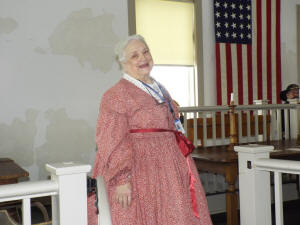
On Saturday, Barbara Stroud-Borth, the Mount Pulaski
Courthouse Director said that the three days with Ellis had been a
wonderful experience for the community and she was pleased that the
well-seasoned story teller could spend time with not just the guests
at the courthouse but also with local students.
[Nila Smith] |